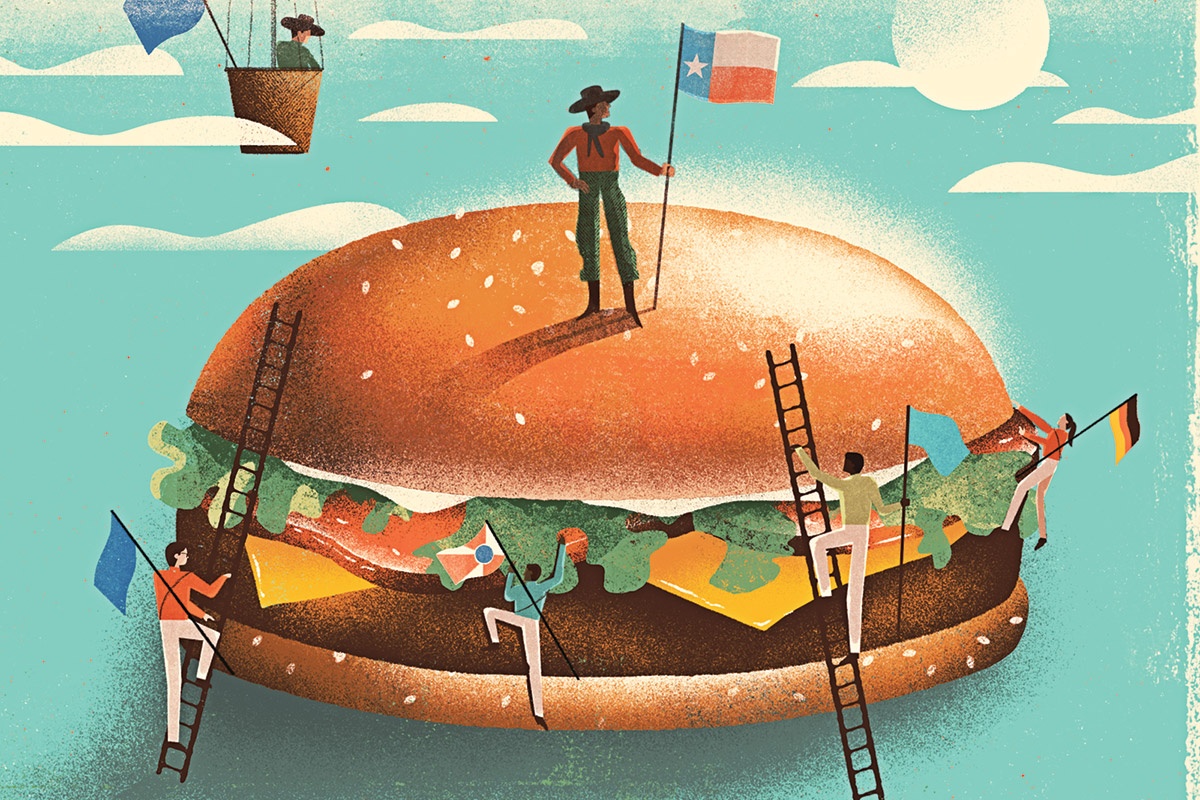The state of Texas officially credits a man named Fletcher Davis, affectionately known as Uncle Dave, with inventing the hamburger in Henderson County—Athens, to be exact—more than 100 years ago. The Texas Legislature cited research from McDonald’s management training center in a 2007 resolution designating Davis as the inventor and Athens as its birthplace.
Former Dallas Morning News columnist Frank X. Tolbert researched the matter in the 1970s and concluded that Davis was frying up ground beef patties and placing them between two pieces of homemade bread with pickles, onions and mustard at a small café on the courthouse square in Athens in the late 1880s. According to Tolbert—and the state of Texas—customers enjoyed Uncle Dave’s sandwich so much that he took it to the 1904 World’s Fair in St. Louis, and the rest is history.
Or maybe not. A 1904 article in the New-York Tribune allegedly verifies that version of events, but no one—not Tolbert nor any number of hamburger historians—has ever read or located the Tribune story, which supposedly doesn’t mention Fletcher by name, identifying him only as an “unknown vendor.”
Uncle Dave made his way into the history books anyway, when McDonald’s corporate staff identified Dave as the original creator of the hamburger in a history of burgers for the restaurant’s Hamburger University.
Since the 2007 Texas hamburger resolution, scholars and food historians have called the research into question, citing a lack of documented evidence. Barry Popik, an attorney and noted etymologist, was living in Texas at the time of the resolution. He says he has thoroughly searched the ProQuest database of the New-York Tribune along with two other databases with links to the Tribune and found nothing about an “unknown vendor” or anybody else selling hamburgers at the World’s Fair in 1904.
“I had just moved to Austin in 2006 and told the Texas House of Representatives that this was fake and must absolutely be rejected,” Popik recalled recently. He said he never received a response.
Popik says the name “hamburger” comes to us by way of Hamburg, Germany, where cooks in the 1800s prepared a dish of minced beef and chopped onions and called it steak. Hamburg is a port city, and in the late 19th century, it served as the departure point for many travelers and emigrants who arrived at their destinations looking for “steaks done in the Hamburg style.” Not until after the “Hamburg steak” started showing up on American menus did somebody come up with the idea of putting the beef between two pieces of bread. But if Davis wasn’t the first to do so, who was?
Seymour, Wisconsin; New Haven, Connecticut; and the Village of Hamburg, New York, also claim the distinction of being home to the world’s first hamburger. New Haven even has an endorsement from the Library of Congress stating that Louis Lassen invented the hamburger at his restaurant, Louis’ Lunch, in 1900. Popik counters with references to “hamburger sandwiches” as early as July 25, 1893, in Nevada’s Reno Evening Gazette and several more references from 1894 through 1896 in Chicago and San Francisco newspapers.
Oklahoma has also submitted a claim to fame as home to the first hamburger because a man named Oscar Weber Bilby served his grilled burger patties on a bun. None of the other claimants said anything about a bun. Without the bun, you have a steak sandwich or maybe a patty melt. You don’t have what we would recognize today as a hamburger.
The late food writer Joshua Ozersky also researched the various claims. He credits Walter Anderson, a grill cook from Wichita, Kansas, with making the first sandwich in either 1915 or 1916. Ozersky, who wrote The Hamburger: A History, determined that Anderson was the first to cook standardized, flat ground beef patties on a custom griddle and serve them on white buns. In 1921, Anderson and his partner, E.W. “Billy” Ingram, founded White Castle, which sold hamburgers by the sack for 5 cents each. The chain still serves a nearly identical sandwich today. Ozersky believed that Anderson and Ingram “deserve credit not just for inventing the hamburger but for inventing the culture that helped make it our national sandwich,” he wrote.
While all of this debunking of the Texas hamburger might be disappointing to many Texans, we can take solace in other more verifiable claims to culinary fame. Dr Pepper, Fritos, Ruby Red grapefruit and the now-ubiquitous ballpark nachos all have their origins—or at least their commercial origins—in Texas.
As for Texas Toast, well, that’s a whole other story.
Clay Coppedge, a member of Bartlett EC, lives near Walburg.


